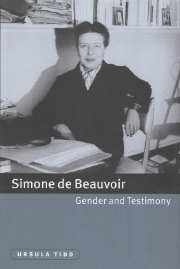Book contents
- Frontmatter
- Contents
- Acknowledgements
- List of abbreviations
- Introduction
- PART I BECOMING THE SELF
- PART II WRITING THE LIFE
- 3 Narratives of self-representation
- 4 Negotiating autobiography
- 5 Writing the self – Mémoires d'une jeune fille rangée
- 6 Bearing Witness with the Other, bearing witness for the Other
- 7 Writing the Other
- Epilogue
- Notes
- Bibliography
- Filmography
- Index
- CAMBRIDGE STUDIES IN FRENCH
3 - Narratives of self-representation
Published online by Cambridge University Press: 22 September 2009
- Frontmatter
- Contents
- Acknowledgements
- List of abbreviations
- Introduction
- PART I BECOMING THE SELF
- PART II WRITING THE LIFE
- 3 Narratives of self-representation
- 4 Negotiating autobiography
- 5 Writing the self – Mémoires d'une jeune fille rangée
- 6 Bearing Witness with the Other, bearing witness for the Other
- 7 Writing the Other
- Epilogue
- Notes
- Bibliography
- Filmography
- Index
- CAMBRIDGE STUDIES IN FRENCH
Summary
Simone de Beauvoir's auto/biographical writing will be the focus of the second part of this study. Although she has tended to (re)present herself as a literary writer rather than as a philosopher, in her testimonial auto/biographical writing as in her philosophy, she reflects on the notion of selfhood through the representation of her own life and the lives of others.
In 1985, Kate Millett compared Simone de Beauvoir's auto-biography to Le Deuxième Sexe, and argued that Beauvoir had affected women just as deeply by her autobiography, but that its effect was not as well recognised. For Millett, if Le Deuxième Sexe had taught women of her generation how to think, Beauvoir's autobiography had taught them how to live. In this chapter, Beauvoir's approach to autobiography will be examined through critical discussion of her relationship to women's autobiographical writing more generally, to the Other in autobiography and her desire to ‘tell all’ in a narrative production of the temporally-situated self.
In terms of the scope of her autobiography, it is difficult to find many comparable French women autobiographers in the twentieth century. One could cite Colette, who has been described as ‘a pioneer in techniques that anticipate the genre of fictional autobiography’. However, her ahistorical and apolitical textual self-representations in ‘impressionist memoir’, ‘autobiographical fiction’ and ‘fictional autobiography’ seem to have little in common with Beauvoir's testimonial autobiographical project.
- Type
- Chapter
- Information
- Simone de Beauvoir, Gender and Testimony , pp. 61 - 86Publisher: Cambridge University PressPrint publication year: 1999
- 1
- Cited by



